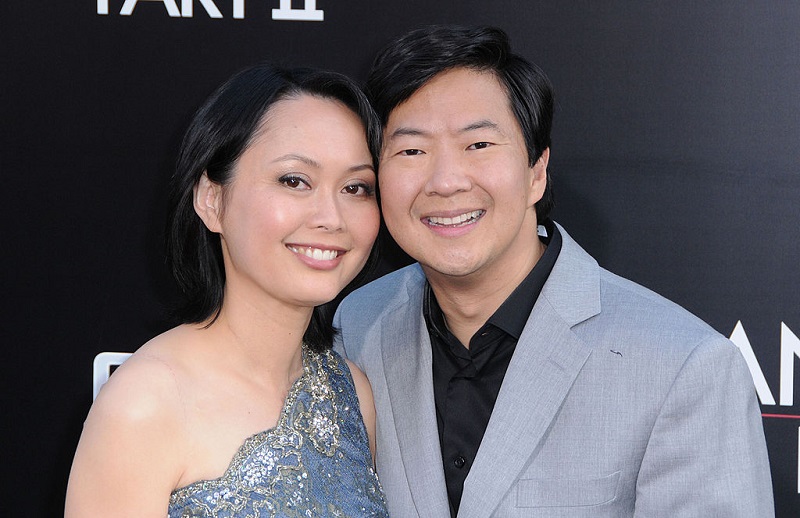The Power of Support
- Known primarily as an actor and comedian, Ken Jeong, 54, is also a doctor who supported his adored wife and fellow physician Tran Ho through a stage 3 breast cancer diagnosis in 2008. Tran had found a lump while breastfeeding their twins, Alexa and Zooey, now 17.
- Upon learning the news, the Hangover star-turned-cancer caregiver admitted he cried his eyes for his wife Tran while he was alone, but when he arrived by his wife’s side he put forth his calm, bedside manner as he shifted into caregiver mode.
- Assuming the role of a cancer caregiver when a spouse, parent, sibling, child, or friend is diagnosed with cancer comes with a unique set of responsibilities. The first thing to understand is that there is no shame is asking for help. This can be an overwhelming time for both patients and their caregivers, too.
- SurvivorNet put together a helpful guide for cancer caregivers that you can check out HERE.
Upon learning the news, the Hangover star-turned-cancer caregiver cried his eyes for his wife Tran while he was alone, but when he arrived by her side he put forth his calm, bedside manner as he shifted into caregiver mode.
Read More
The pair had initially met at a work mixer and were both employed at the same L.A. hospital when they fell in love around two decades ago. Ken practiced internal medicine while Tran’s focus was family medicine. Also holding a deep love for acting, Tran encouraged her husband to pursue his creative outlet as well.
Loving Support Through Cancer
Tran and Ken leaned on their medical training to work through the problem, initially thinking it was an issue related to breastfeeding, but unfortunately their first assessment was wrong. It was triple-negative breast cancer.
Tran’s cancer treatment involved 16 chemotherapy sessions and a mastectomy, and it was followed by radiation.
In a 2011 op-ed for Huffington Post, Ken wrote:
“I stood by her side in complete amazement as she drew from a strength I didn’t know she possessed until she became a mother. She fought back against cancer with everything she had for our girls so that they would grow up knowing a mother’s love, a mother’s instinct, a mother’s touch,” Ken said, also admitting he was “scared out of [his] mind.”

After treatment, thankfully Tran went into remission, declared “cancer-free,” meaning she had no evidence of disease.
“When Tran was told she was cancer-free, it was the greatest moment of my life. In a way, it surpassed our wedding and the birth of our girls because it meant that we would be able to celebrate both of those moments for the rest of our lives,” Ken said.
RELATED: Here Are Top Tips for Cancer Caregivers to Help Them Through the Process
And in turn, because of Tran’s support, the beloved actor is sharing his comedic talents with the world. Since that challenging time, Ken has appeared in huge projects like 2018’s Crazy Rich Asians, along with animated projects Scoob! in 2020 and Tom and Jerry in 2021. The Masked Singer/The Masked Dancer panelist also serves as host and producer of the game show I Can See Your Voice.
Guidance for Cancer Caregivers
Assuming the role of a cancer caregiver when a spouse, parent, sibling, child, or friend is diagnosed with cancer comes with a unique set of responsibilities. The first thing to understand is that there is no shame is asking for help. This can be an overwhelming time for both patients and their caregivers, too.
Through interviews with expert oncologists, social workers, patients advocates, and more, we’ve come up with a checklist of helpful steps cancer caregivers can take throughout the journey.
Cancer caregivers may:
- Attend doctor visits with the patient
- Help the patient take notes/ask questions
- Provide transportation to and from treatment
- Accompany the patient during treatment
- Help keep track of side effects
- Link up with a social worker/patient navigator
- Help with day-to-day activities
- Provide emotional support
“I encourage caregivers to come in to visits with my patients, because in that way, the caregiver is also listening to the recommendations — what should be done in between these visits, any changes in treatment plans, any toxicities [side effects] that we need to look out for, changes in dietary habits, exercise, etc.,” Dr. Jayanthi Lea, gynecologic oncologist at UT Southwestern Medical Center, previously told SurvivorNet. “The work is extremely hard.”
Dr. Jayanthi Lea, gynecologic oncologist at UT Southwestern Medical Center, shares some guidance for new cancer caregivers
Caregivers should be willing to share what they’ve learned while caring for their loved one day to day, letting the doctor know about any side effects or other problems that arise. They also need to be willing to take a backseat sometimes.
“Step back a little bit and let the patient speak for themselves. Let them express what they are feeling,” Dr. Lea added to SurvivorNet. “That is so important for the patient’s overall quality of life and wellbeing.”
How Cancer Caregivers Can Find Time to Care for Themselves
When you suddenly find yourself acting as a cancer caregiver, the lifestyle adjustment can be jarring. Many people welcome the role of cancer caregiver and the opportunity to help out someone they care about deeply but that doesn’t mean it’s easy.
Filling a caregiver role can be extremely stressful and caregivers often neglect their own needs, which can create a host of additional problems. Experts stress that you will be a better caregiver if you also prioritize caring for yourself. Taking care of your health whether that be with diet, exercise, or making time for activities you enjoy is still highly essential.
Julie Bulger gives some tips on how caregivers can care for themselves.
“It is important to have some things that you can do that’s kind of outside of the focus of caring for somebody that you love with cancer,” Julie Bulger, manager of patient and family-centered care at Vanderbilt-Ingram Cancer Center in Nashville, told SurvivorNet. Bulger suggested caregivers find some activities that help them relax like taking a walk or going for a massage.
“There’s a lot of opportunities for support virtually through educational resources, support communities,” she added. “You can talk to somebody. You can get therapy virtually now.”
Learn more about SurvivorNet's rigorous medical review process.

